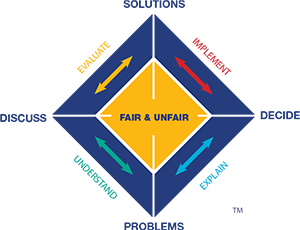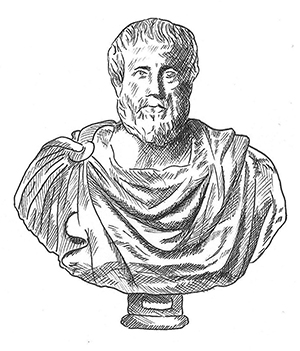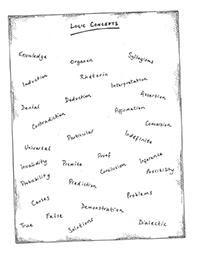Fair and Unfair
-
-

Not all problems are subject to black and white answers. That is, decisions in many cases are based on opinions. For example, one person is selected for a job and the other person is rejected. Or, an organization is chosen to do a contract and another one misses out. Inevitably questions of fairness about the process of decision making arise. As a result, the issue of fairness may become more of a problem than the original task. Expectations are based on certain principles such as equal opportunity. It is important to have such principles in place when it is not possible to have other ways of resolving problems.
A leader is continually establishing the guidelines and assessing what is fair, but also what is necessary in order to succeed. It is not always possible to win and be fair to everyone involved. However, in terms of playing the business game, it is important that one abides by the law and the ethics of doing business. People are respected when they are regarded as firm and fair. Reputation therefore is important.
Many who are effective at preserving a balance of fairness are able to sense issues that will upset the balance. They are then able to use their skills to summarize and involve people in a discussion, rather than just racing to a decision. If those involved are consulted about changes, and have the opportunity to contribute to the discussion and resolution of problems, then they are more likely to see the process as fair, even though they may feel disadvantaged by the decision.
-
Aristotle
 Aristotle was a great thinker and an amazing educator - he founded the sciences of Psychology, Biology and Logic. As a student of Plato and teacher of Alexander the Great, he is also recognized as the originator of the scientific study of life. He made many contributions to our understanding of the world through his teachings, which focused on analytics, logic and clarity of thought. His philosophies have survived and today, his work is a prominent area of study in universities around the world. Distinguishing between what is fair and unfair, formed a major part of the way he philosophized.
Aristotle was a great thinker and an amazing educator - he founded the sciences of Psychology, Biology and Logic. As a student of Plato and teacher of Alexander the Great, he is also recognized as the originator of the scientific study of life. He made many contributions to our understanding of the world through his teachings, which focused on analytics, logic and clarity of thought. His philosophies have survived and today, his work is a prominent area of study in universities around the world. Distinguishing between what is fair and unfair, formed a major part of the way he philosophized."The guest will judge better of a feast than the cook" - Aristotle
-
Applications

Reflect on a situation in which you were treated unfairly. What did you learn from that experience? What would you do differently next time?
Also, what are the decisions that you have to make in the next few weeks that will involve an assessment of what is fair. It may be a decision about a person's career, or it may be something at home. It is useful to use what has been called the ABC approach.-
Assumptions - check them by finding the facts before coming to a conclusion.
-
Behaviour - should you talk with the person when making the decision or send an email?
-
Consequences - what do you think the likely outcomes will be for yourself and the other person?
All negotiations involve feelings of what is fair. To ensure that you are in a position to influence the outcome.
-
-